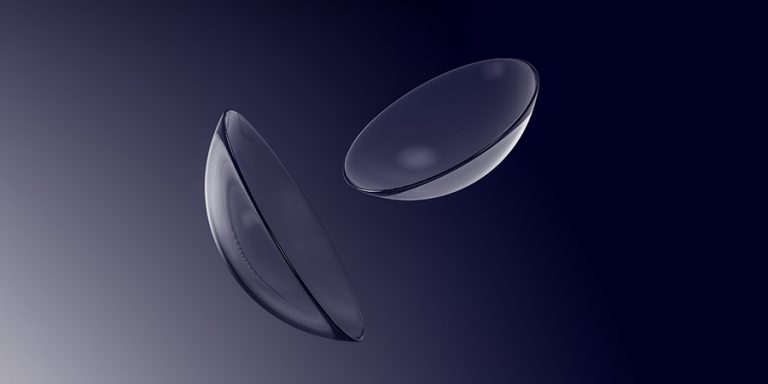
- Wash your hands before handling your lenses
Always wash your hands thoroughly with soap and water before handling your contact lenses. This helps to remove dirt, oil, and other substances that can transfer to your lenses and cause irritation or infection.
- Clean your lenses daily
Clean your contact lenses daily using a reputable contact lens solution. Rinse your lenses thoroughly with the solution and rub them gently with your fingers to remove any debris or buildup. Be sure to follow the instructions on the solution bottle and replace it regularly as recommended.
- Store your lenses properly
Store your contact lenses in a clean, dry case that is specifically designed for contact lenses. Avoid using tap water, saliva, or anything other than a recommended contact lens solution to store your lenses, as this can lead to infection or damage to the lenses.
- Replace your lenses regularly
Replace your contact lenses according to the schedule prescribed by your eye doctor. Over time, contact lenses can become damaged, dirty, or less effective at correcting your vision. Replacing them regularly can help to keep your eyes healthy and your vision clear.
- Avoid wearing your lenses overnight
Avoid wearing your contact lenses overnight, unless specifically prescribed by your eye doctor. Leaving your lenses in for extended periods of time can lead to infection, dryness, and other complications.
- Avoid exposing your lenses to water
Avoid exposing your contact lenses to water, including swimming pools, hot tubs, and shower water. Water can contain harmful microorganisms that can cause infection or damage to your lenses.
- Follow your eye doctor’s recommendations
Always follow the recommendations of your eye doctor when it comes to contact lens care. Your doctor may have specific instructions or recommendations based on your individual needs and lifestyle.
- Use only recommended contact lens solutions
Use only the contact lens solution recommended by your eye doctor. Not all solutions are created equal and some may not be compatible with your specific type of contact lenses. Using an incompatible solution can lead to irritation, discomfort, and even infection.
- Don’t use expired contact lenses or solutions
Never use expired contact lenses or solutions. Expired products may not provide adequate cleaning or disinfection, and can increase the risk of eye infection.
- Avoid using eye drops with your contact lenses
Avoid using eye drops or other medications while wearing your contact lenses, unless specifically prescribed by your eye doctor. Some medications can interact with your contact lenses and cause irritation or damage.
- Remove your lenses if you experience discomfort
Remove your contact lenses if you experience any discomfort, redness, or other symptoms. Discomfort or pain can be a sign of a more serious problem, such as an infection or corneal abrasion.
Gallery
follow eye contact lens tips
- Don’t share your contact lenses
Never share your contact lenses with anyone else, even if they also wear contact lenses. Sharing lenses can transfer harmful bacteria or other microorganisms, leading to infection or other eye problems.
- Follow proper lens insertion and removal techniques
Follow proper techniques when inserting and removing your contact lenses. This can help to prevent damage to the lenses or your eyes, and reduce the risk of infection.
- Schedule regular eye exams
Schedule regular eye exams with your eye doctor to ensure that your contact lenses are fitting properly and your eyes are healthy. Your doctor may recommend changes to your contact lens prescription or care routine based on your individual needs and lifestyle.
- Keep your contact lens case clean
Keep your contact lens case clean and replace it regularly. Bacteria and other microorganisms can accumulate in the case over time, leading to infection or other eye problems. Wash your case with a recommended contact lens solution and replace it every 3-6 months.
- Handle your lenses carefully
Handle your lenses carefully to avoid damaging them. Don’t touch your lenses with sharp or pointed objects or rub them vigorously. This can cause scratches or tears that can lead to discomfort or infection.
stay with us
- Use protective eyewear when needed
Use protective eyewear when needed, such as when playing sports or working with power tools. Protective eyewear can help to prevent eye injuries that can damage your contact lenses or cause other eye problems.
- Don’t wear contact lenses during illness
Avoid wearing your contact lenses during illness, especially if you have a fever or other symptoms that may affect your eyes. Illness can weaken your immune system and increase the risk of infection.
- Follow the recommended wearing schedule
Follow the recommended schedule for wearing your contact lenses, including the amount of time you should wear them each day and how often you should replace them. Wearing your lenses for too long or not replacing them often enough can lead to eye irritation, infection, or other problems.
- Seek medical attention for any problems
Seek medical attention if you experience any problems with your contact lenses, such as redness, pain, or discharge. Early treatment can help to prevent more serious complications and ensure that your eyes stay healthy.
shop now







